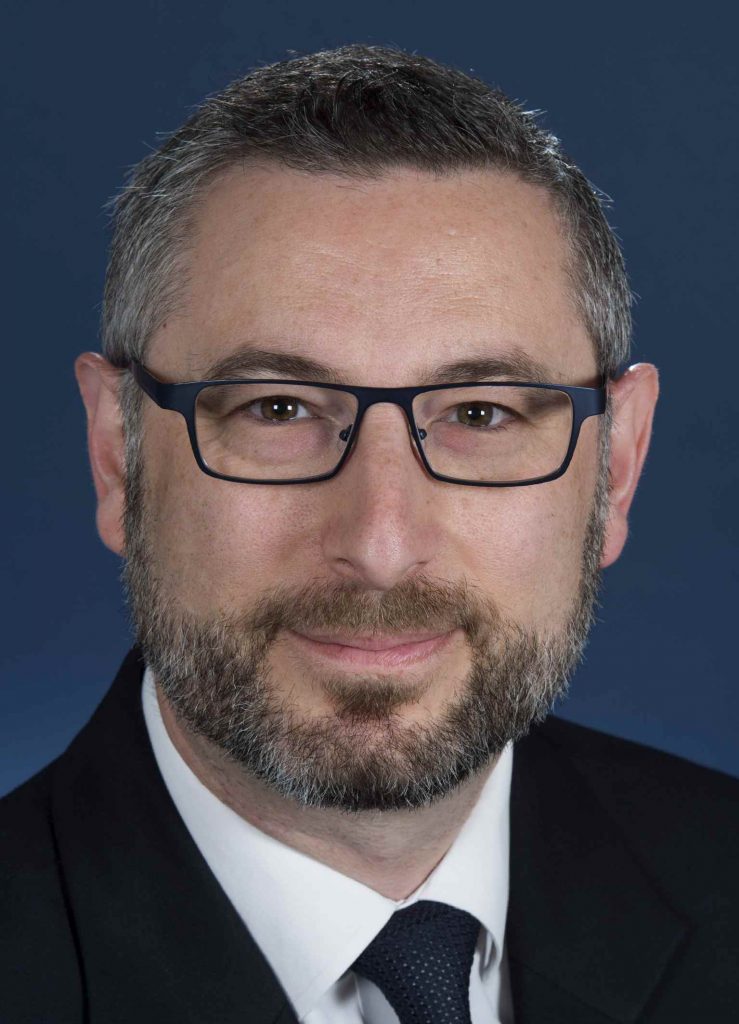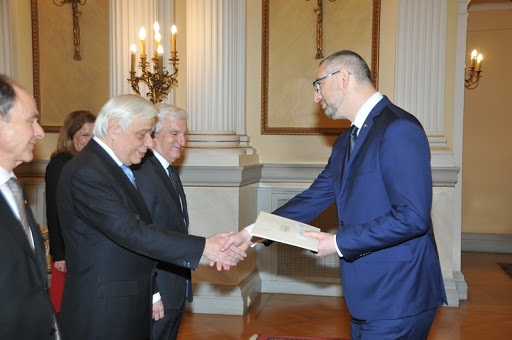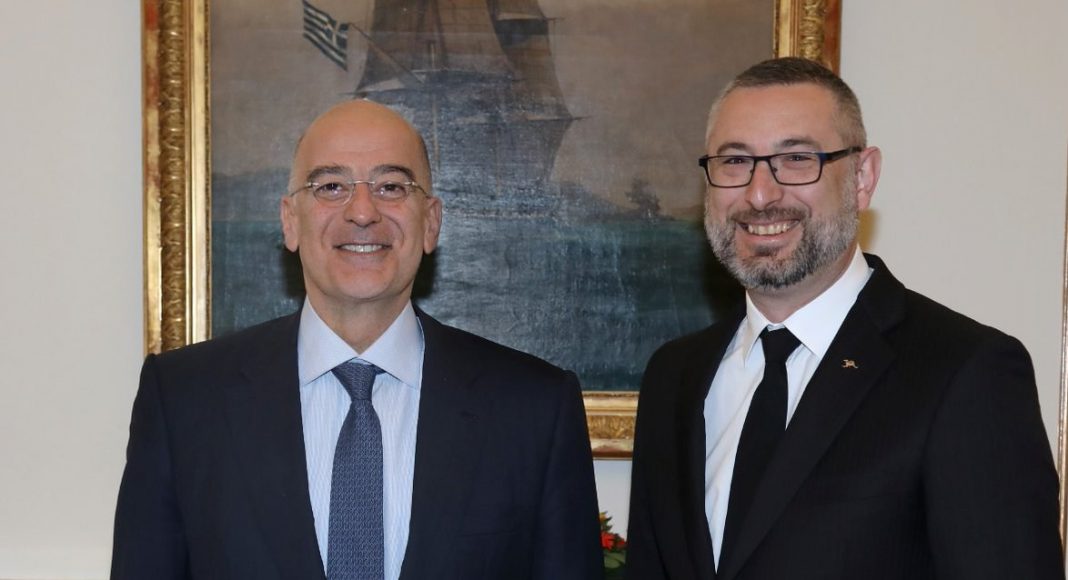By Ilias Karagiannis.
Australia’s Ambassador to Greece, Arthur Spyrou, speaks proudly of the work he and his team have been able to achieve in Greece only a few months into his placement there as an official diplomat.
Born in Athens, Mr Spyrou moved to Australia when he was young and, thanks to his skills and Australia’s open-mindedness, he became one of the country’s most important officials in December 2019.
In this exclusive interview with The Greek Herald, Mr Spyrou covers a whole range of issues which concern the Greeks of Australia, including the COVID-19 health crisis, travel restrictions and the current relationship between Australia and Greece.
- We have been navigating through uncharted waters. How did you spend your time during the lockdown and what were the challenges you faced in the Australian embassy in Athens in these unprecedented days?
It’s a challenge to kick-off a new chapter in the family’s life from the living room! We had only just arrived from Abu Dhabi, where I had been Ambassador for four years, and COVID-19 caught us as we were settling in. The kids had to go into online education in a new school, without the time to make new friends. My wife was enrolled in a Masters course and was travelling abroad periodically to attend classes. That needed an adjustment too. And as Ambassador, your first job is to get to meet a broad range of local contacts, which was more difficult during lock-down. So it was an interesting start!

But we were fortunate as well. Greece is not foreign to us, it’s our second home – so we weren’t adapting to a new place. We have been coming to Greece every year for a long time. We have the entire Greek side of our family here. And I was born in Athens – this is my home town. COVID-19 even gave me an opportunity to help out some of my older relatives, taking them food and groceries while they were in lock-down, popping in to see them, while wearing a mask and social distancing, helping them to manage the isolation. It was therapeutic for me too.
I spent my time in lockdown exploring Greece virtually, without leaving the house! I searched out an incredible professional Greek percussion artist called Alekos Roupas and asked him to teach me via video call. It’s worked so well that I’ve encouraged him to take on students from Australia too. Through Alekos, and my toumberleki, I’ve been able to explore Greece’s stunning native rhythms and its centuries-old musical traditions. I’ve also really enjoyed getting back to reading Greek poetry – Ritsos’s “18 Small Songs for the Bitter Homeland” are a favourite.
I was really proud of how the Embassy team adapted to the challenges posed by COVID-19. We have a great team – experienced, collaborative and resilient. We got together and made a plan that was safe and also suited the services we needed to provide to Australians – we broke up into three teams and worked in a rotation of one week in the office and two working from home. The idea was that even if someone was infected and we quarantined one of our teams, we could still have another team available in the Embassy to help Australians. It was a matter of pride for us that Athens Embassy has not closed so far during the pandemic.
The whole experience sharpened our IT and business continuity processes, and of course brought home that we really needed to look after each other first and foremost. Looking back on that period, the hardest part was missing out on the day-to-day camaraderie we share with colleagues in the office. But we caught up regularly on Webex and we were really looking forward to returning to the office full-time, which we have now done. From what I’ve seen of the team’s resilience and flexibility, I’m confident we can continue to adapt to whatever the pandemic throws at us next.
2. You are not exactly neutral, since you are of Greek origin, but I would like to have your comment on how Greece has dealt with the pandemic? A few cases compared with other countries and consequently the country gained some good publicity from the International Press.
I never said I was neutral! I’m an Australian official. And on that point, I think it says a lot about the Australia’s openness as a community and our strength as a multicultural society, that not only can someone born overseas represent the country, but that one can also represent Australia in one’s country of birth. It’s for reasons like this that we are the most successful multicultural community in the world.
Of course, being Greek-born, of Greek parents, the emotional bond to Greece is strong. I count it as a real advantage in helping me find ways to bring Australia and Greece ever closer. And I was extremely glad to see first-hand how well Greece handled the COVID-19 crisis to date, how saving lives was clearly elevated as the first priority, and how the quick imposition of safety measures certainly achieved that. And of course congratulations for that success also belongs, in large measure, to the Greek people who demonstrated discipline, resilience and courage.
It was also lovely to see that at the helm of the Greek national effort to combat COVID-19 was Sydney-born immunologist Sotiris Tsiodras. One sign of how well Greece has managed this first phase of the COVID-19 outbreak is that Greek Prime Minister Mitsotakis takes part in the regular Smart COVID-19 group of leaders from countries which have successfully dealt with the pandemic to date. Australian Prime Minister, Scott Morrison, is also a member of that group, underscoring how well Australia has also performed during this unprecedented challenge.

3. The Australian citizens of Greek origin are eager to travel in their homeland. Greece has opened the borders to Australian citizens but there is a ban on international travel from the Australian government. According to SETE, last year more than 350 000 people from Australia have traveled to Greece. Are there any developments on this issue, that you can share with our readers and do you believe that is feasible to create a “bubble” between Australia and Greece with direct flights this year or is it premature such a discussion?
Health comes first, of course. So unique is the current situation that the Australian Government imposed a “do not travel” advisory across the board for all countries, for the first time in our history. We still have a lot to learn about COVID-19 – but we do know it is extremely virulent and that travel restrictions have been a critical measure in stopping its spread in both Australia and Greece. The Minister for Trade, Tourism and Investment, Simon Birmingham recently commented in a speech at the National Press Club that the prospect of the ban on overseas travel was likely to extend to 2021. So on the potential for “a bubble” between Australia and Greece, I’d expect that to still be a little way off.
4. What’s your first impressions on the political landscape in Greece and what are the objectives of Australia from those meetings?
I met around 20 Ministers in the last couple of months, including a couple through video calls during the lock down, as well as many other senior officials in Athens and Thessaloniki. The first priority has been to get well enough plugged-in to be able to assist Australian citizens and Australian businesses when they need it, especially in the COVID-19 context. Our first priority over the last few months has been to help Australians return home safely and to be a source of advice and assistance where we can offer help. We also collaborate with the local government to share and gather best practice about dealing with the pandemic, and strengthening the economy. Another big priority is to promote the conclusion of the Australia-EU Free Trade Agreement, which is currently heading towards its eighth round. When it’s concluded, it can play a really important role to help in Australia’s and Europe’s economies grow out of the COVID-19 slow-down, and therefore to help families on both sides who might be feeling economic pressure.

5. What are priorities of the Australian Embassy in Greece in the upcoming strange months due to the pandemic? On which areas are you going to focus and what are your initiatives, that you can share with our readers, if there are any?
There are a lot of things I want to accomplish while I’m here. As I’ve said our first priority is helping out Australians, Australian families and Australian businesses abroad. I want to expand trade and investment flows. It’s a priority for both governments and is essential given the economic impact of COVID-19 worldwide. In that context, I’d like to help the Australia-EU Free Trade Agreement get over the line, and I feel there is the political will on both sides for this to happen, possibly as early as next year. Next year we will be celebrating the 80th anniversary of the Battle of Crete. It will be an important event that recognises the sacrifice and bravery of the Australian, New Zealand and British forces, but also the tenacity and generosity of the Cretan people, who looked after our soldiers at great risk to themselves.
2021 also marks 200 years since Greece’s war of independence. We will have a set of year-long activities to mark the event, hopefully including some projects that will have a long-term impact –stay tuned! You’ll also be interested to know we have already started a promotion celebrating Australia’s multiculturalism and the contribution of Greek Australians to Australian society. You can follow us on twitter on @AusAmbAthens and on facebook on the AustraliaInGreece handle. I’m really enjoying putting that together. I also want to make sure we raise the profile of the island of Lemnos, which was an important chapter in the Gallipoli campaign and is not so well known. It’s the first theatre where Australian nurses served abroad and I really want to make sure we recognise and honour their contribution.
And that’s only a part of the Greek agenda. I’m also Ambassador to Romania and Bulgaria!
6. Greece is your second home. I believe that the land of your ancestors was Arcadia. How do you feel in Greece? Is Athens a good city to live?
I count all of Greece as the land of my ancestors and I feel I’ve got most of the country covered! I was born in Athens. My father, Dr Miltiades Spyrou came to Australia as the first Director of the Greek National Tourist Organisation office in Sydney. He was born in Komotini in Thrace, and his father was from a village outside Thiva in Boeotia. His mother was a refugee from what is today Bursa in Asia Minor. My mother, Katy Spyrou, was born in Piraeus. Her mother had origins from Chania in Crete, Santorini, Andros and Evia. My maternal grandfather was from a village outside of Tripoli in Arcadia, as you mention. But of course Greece is not just a collection of places. Hellenism is as much broader concept.

Athens is a great place to live. It’s timeless –both ancient and modern at the same time. It’s bustling, but you can still find yourself all alone at Kallimarmaro stadium or at Kerameikos cemetery or in a nook somewhere. You can know it your whole life and still never know all its secrets. Athens is a place that makes you feel humble. People here have been going about their business, living, loving, running businesses, creating great art, developing new political systems, for millennia and you see traces of it everywhere.
7. What’s your favorite place in Athens?
So many places to celebrate in Athens! The Acropolis comes first of course. When I was a boy I remember being able to sit in the temple itself, on the cold marble in winter, eating hot roast chestnuts. The Herodes Atticus Odeon, just below it, where years ago I watched a performance of “Thessalikos Kyklos” by Greek composer Yannis Markopoulos. The magnificent little Byzantine-era chapel of Saint Demetrius Loumbardiaris at the foot of the Acropolis, on Filopappou Hill. It’s our family church in Athens – I was married there and my three kids were baptised there. The Bay of Zea in Piraeus, not far from which I went to school…
8. Your favorite Greek food?
Just one? My late mother’s rabbit stifado. Will never be repeated. My aunt Nicky’s famous spanakopita – she opens her own fillo. It’s a world-beater. I can share her recipe if your readers would like! And a good galaktomboureko fresh from the oven is also a thing of beauty!
9. Island or a city that you like to go for a relaxing weekend?
Evia island. Swimming down at Chiliadou beach. Spit roasted lamb up in the mountains at Steni.
10. What’s your favorite Greek expression?
I love the Greek words ‘pallikari’ and ‘levendis’ – which capture proud aspects of the Greek character and are, of course, untranslatable into other languages. I love them especially because I have three ‘pallikaria’, three ‘levendes’ at home – my three boys, Miltiades, Iason and Aristotelis.
11. And what’s the most vivid expression associated with Greece?
In the novel, “Report to Greco” by Nikos Kazantzakis, who also wrote “Zorba”, there is a passage that I love and which I feel is vividly Greek. The writer addresses El Greco directly as his “grandfather” – he calls on his “grandfather” to make a demand of him about how he should live his life. Greco tells him to “reach as far as you can”. But the writer comes back asking for a more difficult, “more Cretan” demand. Then his “grandfather” tells him to “reach as far as you cannot”.

